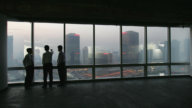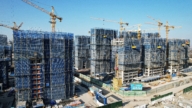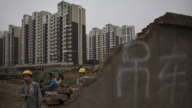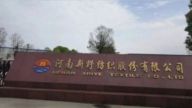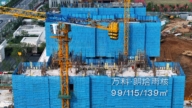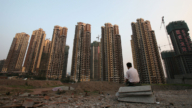【新唐人2013年08月01日讯】最近,中国大陆的房地产市场出现一种混乱现象,一方面,房地产商大量低价抛售房屋套现,另一方面,房价出现报复性反弹,千人抢房潮在各地涌现。大陆社会前一段时间出现“钱荒”并伴随股市大跌以后,外界认为接下来应当是房地产市场出现重大调整。那么,现在出现这类与“钱荒”相背离的现象是什么原因呢?请看本台记者的报导。
自6月下旬,中国社会出现钱荒之后,股市也发生了巨大波动,然而,统计局调查的数据显示,中国房地产市场仍然处于上涨通道。指数报告显示,6月份,房价相对于去年,上涨了一成,一线城市的房价上涨幅度更是领“涨”全国,达到了两成。杭州、深圳、上海、南京等几个具有楼市风向标意义的城市,却再度出现住房抢购潮。
有业内人士认为,目前的抢房潮涌现,属于“报复性反弹”。
《中华工商时报》对这种房价上涨的现象也曾撰文分析说,抢房潮背后都有“房托”身影。
美国南卡罗莱纳大学艾肯商学院教授谢田:“实际上他们在做最后一个赌博的时候,继续雇佣一大批房托,来制造一种恐慌,一方面给中央政府一个下马威,另一方面再度造成百姓的恐慌情绪,希望把房市继续炒热起来。”
广州近郊一别墅楼盘上周五开盘,推出特价房发售,最低价别墅28万起价,当天迎来超过3万人的人流。另一广州近郊公寓楼,推出一口价的几十万元起价的特价房,很多广州买家表示捡到了“白菜价”。
谢田:“我认为价格崩盘已经开始,如果继续下去,房地产泡沫整个破灭已经在进行之中。”
北京市在刚过去的周末,开售的3个楼盘,其中两个成为即日闪电售罄的“日光盘”。
“我爱我家”置业顾问卢赵凯告诉《新唐人》,尽管控制房价的政策不断出台,税收也已经很高,但是自08年以后,北京房价一直在上涨。
我爱我家置业顾问卢赵凯:“各个城市都往北京聚集,北京高官也比较多,都在北京买房子,房价自然会涨,再一点,北京三环四环哪有空地买房子,只能买二手房,但二手房好房子人家不卖,想买的话,那必须出高价钱才能买得着。”
据分析,这一方面是存在刚性需求的购房者及时出手,使得开发商资金链短缺局面得到了缓解,另一方面,大量的理财产品、民间资金以及银行信贷深度介入了房地产市场,加上超过700亿的海外融资,使得“钱荒”似乎没有烧到房地产市场的“眉毛”,另外,中共超额发行钞票也自然促使房价上涨。
经济学者芧于轼:“我猜想,财富的分配集中在少数人手里,他们怕通货膨胀,钱要贬值,所以就买房。”
大陆房地产“大炮”任志强在“钱荒”当时,曾经提出“钱荒影响房价论”。任志强认为,长期钱荒一定影响地产行业,没钱拿地,会恶化房市的供求关系,导致房价上涨。
不过北京“天则经济研究所”副所长冯兴元认为,中共正在试点缴收房产税,房地产商囤积了很多住房,老板们为了规避房产税,或许提前打折卖出。
采访编辑/刘惠 后制/李勇
China: Cash Shortage, Rising Housing Prices
Recently, China’s real estate market appeared chaotic.
On the one hand, sellers sell houses at a low price for cash;
on the other hand, thousands of buyers rush to buy houses.
Not long ago, a cash shortage in China was followed
by a stock market crash.
The public speculates that a major real estate market
adjustment should take place next.
What’s the reason behind it?
Let’s take a look.
In late June, China’s stock market underwent tremendous
fluctuations after the banks’ shortage of cash.
However, national statistics show that
housing prices still went up.
In June, housing prices increased 10% year-on-year.
In first-tier cities, new home prices went
up 20% year-on-year.
In several leading cities such as Hangzhou, Shanghai,
and Nanjing, people rush to purchase their homes.
Insiders said that the current phenomenon, with so many
people buying homes, is a “retaliatory rebound.”
Xie Tian, professor at Aiken Business School, University
of South Carolina: “This is the last gamble.
They hire fake buyers to create panic, so as to press
the government, and established a panic environment for home buyers.
Thus, they can continue to raise housing prices.”
Last Friday, apartments located in a suburb of Guangzhou
went on the market starting from 280,000 yuan (US$45,600).
On the same day, they received
more than 30,000 visitors.
In another area in Guangzhou, a special offer was given
on apartments, which started from several tens of thousands of yuan.
Many buyers expressed happiness for the cheap deal.
Xie Tian: “I believe the price crash has begun.
The entire real estate bubble burst is already underway.”
Last week in Beijing, three apartment buildings went up
for sale, and two of them sold on the listing day.
Lu Zhaokai, a property consultant, told NTD that although
the government continues to adopt a housing price control
policy and charge high taxes, since 2008, Beijing’s
home prices have been constantly increasing.
Lu Zhaokai: “People are gathering to Beijing.
Many senior officials live in Beijing.
They bought homes in Beijing,
and housing prices certainly went up.
In Beijing’s third and fourth ring areas,
people only have a chance to buy an old house.
If the old property is too good, it’s normally not for sale,
if you want to buy it, you need to pay a high price.”
Sources said that some home buyers rigid demand to buy
thus helping sellers to ease fund shortage problem.
A large amount of financial products, private funds and
banks loans were deeply infused into the housing market,
coupled with 70 billion yuan (US$11.4m)
of foreign financing.
A money shortage doesn’t seem to damage
the housing market.
The government’s release of large bank notes are also
pushing the housing prices up.
Economist Mao Yushi: “I suspect that the distribution
of the wealth is concentrated in a few hands.
They worry about inflation, the devaluation of money,
thus they bought properties.”
China’s entrepreneur Ren Zhiqiang has said that
“a cash shortage would effect housing prices.”
Ren believes that a long-term money shortage would
certainly influence the real estate industry.
Without money occupying the land, the housing market’s
supply and demand will worsen, causing housing prices to rise.
Feng Xingyuan, deputy director of Beijing
Unirule Institute of Economics, said that
since the Chinese Communist Party is piloting
a property tax plan,
real estate sellers who owned many homes over the years
may sell houses at a discount in order to avoid paying tax.



